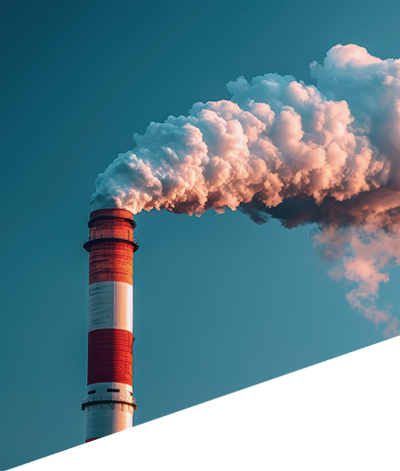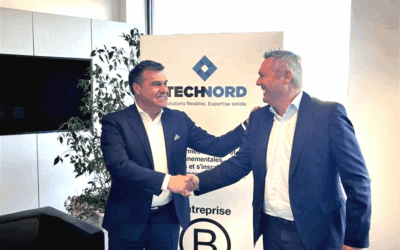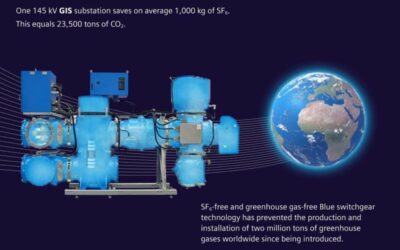Decarbonizing industry: go green with Technord

The decarbonization of industry is now a central issue in the ecological transition. As the main emitters of greenhouse gases, industries are called upon to play a key role in achieving carbon neutrality. Beyond the environmental imperative, decarbonizing industry is also a powerful lever for competitiveness. But what does this process actually involve, and how can you effectively implement it in your industry?
Technord, expert in industrial solutions, supports you in this transition with tailor-made solutions.

Decarbonizing industry: definition & challenges
Decarbonization of industry encompasses all actions aimed at reducing, or even eliminating, CO2 and greenhouse gas (GHG) emissions generated by industrial processes.
For Technord, this approach implies a global strategy, combining innovative technologies and energy optimization to minimize the environmental footprint while increasing operational efficiency.
Our goal? Help manufacturers invest in more efficient, less polluting processes and equipment.
Our approach revolves around overhauling industrial processes, implementing renewable energy solutions, combating waste and modernizing infrastructures for a greener future.
With 30 years’ experience serving a wide range of industrial sectors, Technord can help you transform these challenges into opportunities, offering comprehensive expertise for every stage of decarbonization.
A few statistics to provide some context
The industrial sector is responsible for 23% of global GHG emissions, the majority of which come from the combustion of fossil fuels.
In France, industry is responsible for almost 20% of emissions, just behind the transport sector.
And in Belgium, it is estimated that Belgian industry will need to invest at least 25 billion between now and 2050 in order to achieve the industrial decarbonization targets set by the EU (Paris Agreements, European Green Pact). The chemical industry will be the most costly to decarbonize.
While the road ahead may still seem long and tedious, solutions, initiatives and assistance are multiplying to help the industry in its quest for sustainability.
Sectors concerned by the decarbonization of industry
Heavy industry is at the forefront of the decarbonization process because of its energy-intensive processes, often requiring extremely high temperatures.
These sectors are therefore particularly targeted when it comes to reducing CO2 emissions. According to the French Agency for Ecological Transition (ADEME), the chemical industry alone generates 25% of the industrial sector’s greenhouse gas emissions, followed by the steel industry with 22%.
Cement production accounts for 12%, while aluminum production contributes only 5%.
However, light industry is not exempt from these challenges. Companies in the food, automotive, textile and electronics sectors are also being asked to step up their efforts to combat global warming.
At Technord, our teams are committed to helping industries in all sectors – chemical, steel, food and extractive – reduce their carbon footprint.
Environment
Mining and quarrying
Food industry
Chemistry
Other industries
Decarbonizing industry: what approaches should be considered ?
At Technord, we believe that industrial transformation requires a systematic and structured approach. When it comes to decarbonizing industry, here’s what our solutions can deliver:
Improving energy efficiency
Energy efficiency is the cornerstone of the industrial decarbonization process. The aim is to significantly reduce energy consumption while improving the performance of industrial equipment and machinery. This means reducing the impact of reactive power, which leads to higher energy consumption and higher costs. Reactive power causes voltage drops, cable heating and transformer overloads, all of which impact on overall plant efficiency.
To this end, our experts in industrial electricity & networks work hand in hand with numerous customers in Belgium, France and around the world to help them adapt their existing installations and infrastructures to this desire for decarbonization.
Finally, improving energy efficiency also extends to production processes, requiring investment in high-efficiency technologies to optimize energy management and reduce losses.
At Technord industry 4.0 and energy efficiency are at the heart of our approach. Connected industrial networks, IIoT, real-time control and prediction, artificial intelligence: our specialists optimize your industrial processes to reduce energy consumption and maximize performance gains, at every level.
The use of renewable energy sources
Replacing fossil fuels withrenewable energy sources, such as solar, wind and hydro power, is a central pillar of the decarbonization process.
This energy transition will significantly reduce CO2 emissions while ensuring more sustainable production.
To this end, Technord offers you relevant solutions to monitor the status of your installations in real time, visualize your consumption and production levels, guide your operators or automate your processes to achieve energy savings.
What are the challenges of decarbonizing industry ?
The decarbonization of industry meets energy, environmental, economic, technical and societal imperatives.
blank
Reducing CO2 emissions: a lever against climate change
The decarbonization of industry is an integral part of the energy transition, aimed at achieving carbon neutrality, i.e. a balance between greenhouse gas (GHG) emissions and their absorption by natural ecosystems. The objective, set by many countries around the world including France and Belgium, is to limit global warming to 1.5°C by 2050.
A significant economic impact
The decarbonization of industry represents a major competitive lever for industrial companies. By reducing their dependence on fossil fuels and fluctuating gas and electricity prices, industries that commit to this approach enjoy tangibleeconomic benefits . What’s more, the adoption of innovative technologies and industrial breakthroughs gives them a sustainable competitive edge in the marketplace.
A more committed brand image
Decarbonization also represents a strategic opportunity to improve the industry’s image. Indeed, consumers and investors alike are attaching increasing importance to companies’ environmental commitments. By integrating this approach into their CSR strategy, industries can also benefit from improved financing conditions and better access to investment funds dedicated to the ecological transition.
A definite asset for the company
The transition to a low-carbon industry offers significant societal benefits:
- It stimulates job creation in key new sectors (renewable energies, green technologies, circular economy, etc.).
- It helps improve public health by reducing air pollution levels.
Comply with current regulations
A commitment to decarbonizing industry enables companies to comply with current legislation.
Measures taken by France
Through the Energy-Climate Act of November 8, 2019, France plans to achieve carbon neutrality by 2050. The aim is to reduce GHG emissions by 55% compared to 1990 levels; this translates into a 6-fold division of emissions throughout the country.
The government also passed agreen energy law in October 2023, with the aim of creating new jobs and promoting sustainable production. The scheme focuses on decarbonized industrial sites, recycling channels, industrial waste recovery and the financing of green projects.
What about the European Union?
In Europe, the massive decarbonization of industry is centered on ” Fit for 55 “. In other words, the member states of the European Union (EU) are obliged to achieve carbon neutrality by 2050.
The ambition is to become the first carbon-neutral continent. The EU is targeting a 62% reduction in GHG emissions by 2030, compared with 2005 levels.
The amendment to the EU-ETS directive overhauls the carbon market, in particular by phasing out the free allowances enjoyed by certain sectors such as cement, steel, aluminum, hydrogen and fertilizer, with measures to promote low-carbon technologies.
PROJECTS & References
Some examples of Technord’s industrial decarbonization projects
At Technord, decarbonizing industry is not just an ambitious goal, but a concrete reality for many of our customers. Every day, our specialized teams deploy tailor-made solutions in various industrial sectors around the world. Thanks to our expertise in optimizing industrial processes and integrating cutting-edge technologies, we help companies reduce their CO2 emissions while improving their energy performance.
Whether it’s electrifying processes, optimizing energy consumption, using renewable energies, recovering heat or implementing innovative technologies, our approaches are part of a long-term vision aimed at reconciling industrial competitiveness with respect for environmental issues.
The results speak for themselves: our projects have significantly reduced thecarbon footprint of numerous industrial sites, while generating substantial energy savings for our customers.
Find out more about these projects :
Siemens welcomes Technord to its Grid+ partnership program to accelerate energy transition and digitization
Technord joins the Siemens Grid+ partnership program to enhance energy automation and smart grid applications, with the aim of accelerating energy transition and digitization. Siemens and Technord will work together on smart grids, the integration of renewable...
Technord Belgium renews its Pharma Siemens certification!
For almost 18 years, Technord Belgium has distinguished itself as a Solution Partner Expert Pharmaceutical Module. We recently passed our 8th audit by Siemens Germany's Pharma Competence Center, confirming our expertise and commitment to excellence in the...
Environmentally-friendly grid connection
Technord and Siemens Energy join forces for a sustainable future We are proud to announce our participation in an innovative, environmentally-friendly project that will significantly reduce CO2 emissions and contribute to a more sustainable future. Collaboration and...
How to launch an industrial decarbonization project ?
Decarbonizing industry involves several key stages.
To guarantee the success of this approach, Technord has positioned itself as a key partner in industrial energy management.
With over 30 years’ experience as an industrial integrator, we help companies optimize their energy performance.












